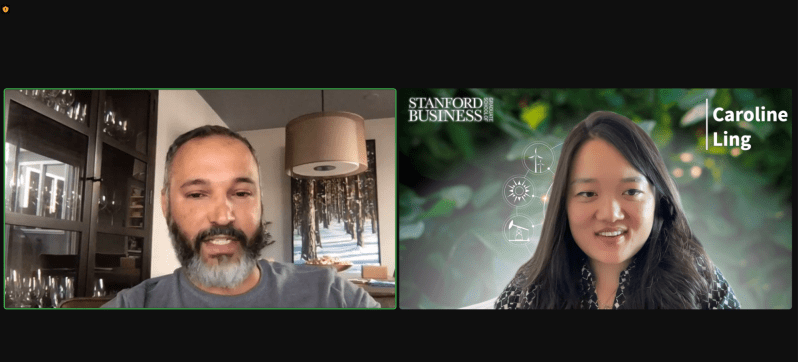“Solving climate change is a piece of cake,” Google’s Circular Economy Strategy Lead and Founding Member of the Devices and Services Sustainability Team David Bourne said during a Thursday event.
While Bourne acknowledged that this statement is not entirely true, he said the possibility was within reach during the “Trash Talk Series” event.
Stanford All About No Waste Network’s “Trash Talk Series” features speakers working in sustainability who share their insights into how resource usage can shift from a linear supply chain toward a circular economy model — the end of a product becomes the start of another as materials are recycled again.
At Google, Bourne is working to create a more circular e-waste supply chain. Google has made commitments to include recycled material in 100% of Made by Google products by 2022 and to use recycled or renewable plastic in at least 50% of their hardware products by 2025.
Bourne said that using bio-based plastic, however, is Google’s “second choice” as an alternative to recycled material. Although bio-based plastics might be better than plastic alternatives, not all bio-based plastic is compostable or recyclable, so they may not be less wasteful, he added.
In their process, Google wants to revive wasted materials, removing resources that have exited the supply chain first, according to Bourne. Yet there are many kinds of waste materials that society does not yet know how to tackle. “We have to contend with thousands of artificial materials that never existed in the millennia of our planet,” Bourne said. Therefore, focusing on removing existing wasted materials by redirecting the resources back from their end-of-life is crucial to the sustainability of the future, according to him.
For Google, a big tech company with large demands for materials, integrating recycled materials into their products imposes demand-side pressure for the supply chain to become more circular, he added. In other words, if big companies like Google start to buy recycled materials, it will signal to factories that there is an economic incentive to recycle this plastic waste.
Additionally, consumer demand for more sustainable products stimulates firms to become more sustainable, trickling down the supply chain, according to Bourne. Drawing on his background in product quality and user experience, he said that “user experience required in decision-making is not to be overlooked.”
By making the user experience as convenient and streamlined as possible, consumers can facilitate the recycling of products after their end-of-life phase back into the system. The rise in recycling and awareness around circularity can signal the demand for more environmental products, he added.
Bourne’s recent blog article addresses another aspect of the circular economy: consumer perception and behavior when it comes to treating e-waste. Bourne contrasted the ease of recycling empty coke bottles to old electronics, which may be more difficult with extra considerations such as reusing the device, data security and other complex components. Consequently, consumers’ e-waste is “hibernating in drawers, closets, attics and garages” which delays when we address the proper disposal of e-waste, Bourne wrote.
In fact, there is a wide variety of options to handle e-waste. For instance, there are many options to drop off your e-waste around Stanford, and tech firms such as Apple are starting to allow their used products to be recycled within their supply chain. Bourne said, however, that these tech companies do not truly engage with consumers, leaving factors like “convenience, awareness, data and value propositions” to be addressed.
As firms such as Google strive to become more sustainable, Bourne said this responsibility is also passed onto suppliers.
“If I gave you a list of 10 or 20 of our suppliers, you might not recognize any of them.” Bourne said. “I think the visibility of companies in the supply chain has to change so that there is greater accountability for those companies.”
